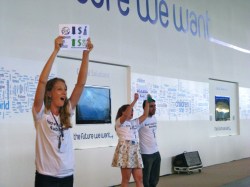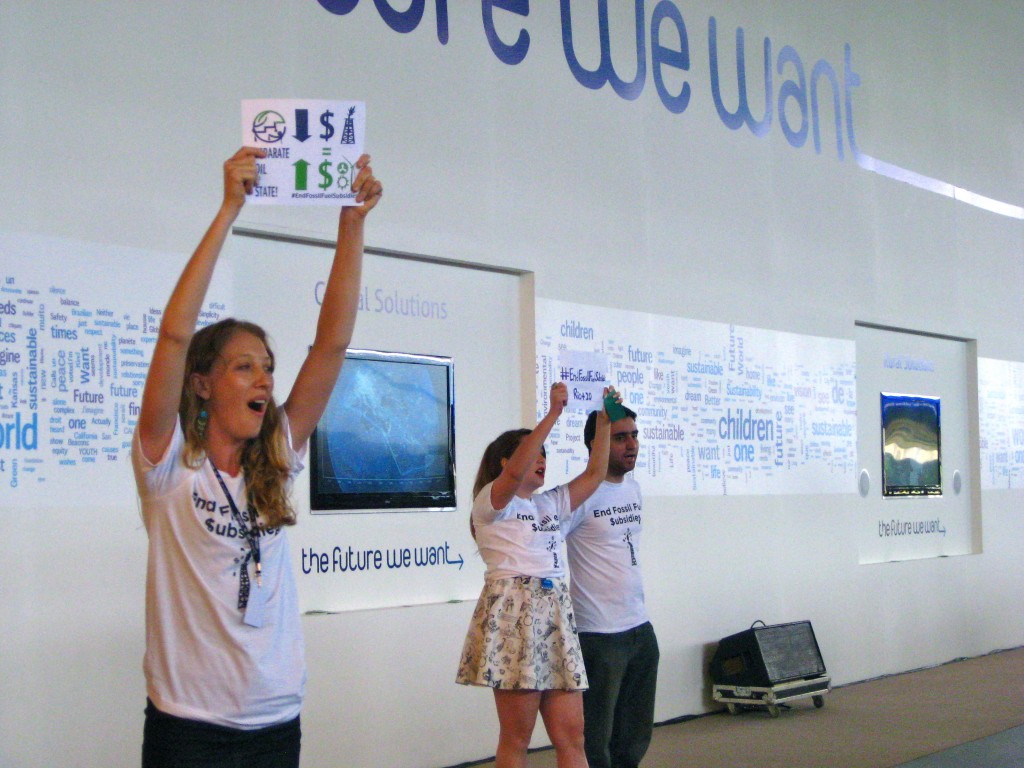
Youth activists staged a “flash mob” at the Earth Summit talks yesterday, part of a broader effort to roll back subsidies for fossil fuels. (Photo courtesy of Human Impacts Institute.)
The Crazy Twitter Kids got a lesson in international diplomacy yesterday during a panel before the Rio+20 Earth Conference in Rio de Janeiro.
The panel was part of a broader push to end an estimated $1 trillion in government subsidies that go to fossil fuel companies around the world each year. At an event that has brought an incredible diversity of people to Rio, this was a largely white, Western bunch, with three Americans and a Scot (who currently resides in New York), no women (with the exception of Natural Resources Defense Council President Frances Beinecke, who introduced the event and then left), and a single researcher from India. Representatives of three environmental groups took turns arguing that it was time to stop pouring our tax money into oil, gas, and coal companies, and instead invest in clean energy like solar and wind.
“We’re handing a $1 trillion bill each year to the most profitable companies the world has ever seen,” said Iain Keith, a campaigner with Avaaz. “The measure of success this week will be whether or not we’re still paying $1 trillion to polluters after Rio.”
It was a clean, simple message at an event that has been characterized by cacophony and chaos, and even as the panelists spoke, it was going bananas on the Interwebs. Jamie Henn, communications director for the climate action group 350.org, beamed that, thanks to a “Twitterstorm” orchestrated by his group and others, the hashtag #EndFossilFuelSubsidies” had hit No. 2 on the list of top trending topics on Twitter worldwide. (No. 1 was “20FactsAboutMe.”) He rattled off the names of celebrities (Stephen Fry, Mark Ruffalo) and politicians (Nancy Pelosi, Mike Lee) who had added their voices to the storm. “We’re looking to see if that message can break through here in Rio,” he said.
If the conference room was any indication, it didn’t.
When the panelists had finished, a man from Nigeria rose to berate them for using “skewed statistics,” and for arguing that ending fossil fuel subsidies should be top on the list of priorities in Rio. “The No. 1 priority in developing countries is poverty eradication,” he said, adding that subsidies in his country help poor people afford fuel for generators that provide their sole source of electricity.
Panelist Srinivas Krishnaswamy, executive director of the Vasudha Foundation in India, had given a detailed Powerpoint presentation arguing that fossil fuel subsidies in his country failed to reach the poor, but that wasn’t enough to convince audience members from the developing world. “We need to be very careful when we talk about ending fossil fuel subsidies,” said a man from Kenya. “Subsidies that benefit large corporations are bad. Subsidies that benefit poor people are good.”
Another audience member reminded the panelists that thousands of people took to the streets in Indonesia earlier this year to protest a proposal to end fossil fuel subsidies in that country. The Indonesian parliament quickly vetoed the proposal. Nigeria saw similar protests this year.
In fact, these are things the panelists and their organizations understand well, and behind the scenes, they are making much more detailed plans and proposals. But the event revealed that a simple, clean message can be a liability. In its desire to drive home a singular agenda, the panel managed to pick a scab on a long-festering wound in international environmental regotiations: The perception that developed countries are asking the developing world to clean up its act without providing sufficient economic aid, and without understanding the challenges the poor countries face.
In the end, the Twitterstorm probably did more than any other action to push word of the Earth Summit out to the wired public. In that sense, it served its purpose. Whether it will lead to any concrete action is another question. As Brad Plumer pointed out on the Wonk Blog yesterday, ending fossil fuel subsidies is a seductively simple idea, but it is proving to be quite difficult to achieve.
The devil, as they say, is in the details. But then, it’s the details that have threatened to derail the Rio talks. A mass call to end fossil fuel subsidies cut through a lot of the chatter here in Rio, at least for a minute. Now, back to the drawing board to figure out just how we’re going to make this work.
For all of Grist’s Earth Summit coverage, click here.



